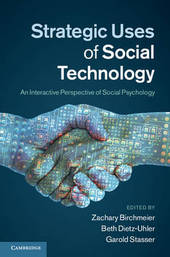
|
Strategic Uses of Social Technology: An Interactive Perspective of Social Psychology
Hardback
Main Details
| Title |
Strategic Uses of Social Technology: An Interactive Perspective of Social Psychology
|
| Authors and Contributors |
Edited by Zachary Birchmeier
|
|
Edited by Beth Dietz-Uhler
|
|
Edited by Garold Stasser
|
| Physical Properties |
| Format:Hardback | | Pages:226 | | Dimensions(mm): Height 235,Width 157 |
|
| Category/Genre | Ethical and social aspects of computing |
|---|
| ISBN/Barcode |
9780521899260
|
| Classifications | Dewey:302.30285 |
|---|
| Audience | | Professional & Vocational | |
|---|
| Illustrations |
1 Tables, black and white; 6 Line drawings, unspecified
|
|
Publishing Details |
| Publisher |
Cambridge University Press
|
| Imprint |
Cambridge University Press
|
| Publication Date |
22 September 2011 |
| Publication Country |
United Kingdom
|
Description
On an everyday basis, we communicate with one another using various technological media, such as text messaging, social networking tools, and electronic mail, in work, educational, and personal settings. As a consequence of the increasing frequency of use and importance of computer-supported interaction, social scientists in particular have heeded the call to understand the social processes involved in such interactions. In this volume, the editors explore how aspects of a situation interact with characteristics of a person to help explain our technologically supported social interactions. The person-by-situation interaction perspective recognizes the powerful role of the situation and social forces on behavior, thought, and emotion, but also acknowledges the importance of person variables in explaining social interaction, including power and gender, social influence, truth and deception, ostracism, and leadership. This important study is of great relevance to modern readers, who are more and more frequently using technology to communicate with one another.
Author Biography
Dr Zachary Birchmeier is currently an Instructional Technology Support Specialist at Stephens College in Columbia, MO, USA. He received a PhD in Psychology from Miami University in 2004. Beth Dietz-Uhler is Professor of Psychology at Miami University. Her research interests include intragroup and intergroup behavior, reactions to threats to social identity, sport fans and spectators, and computer-mediated communication. Garold Stasser is Professor of Psychology at Miami University. His published work has appeared in the Psychological Review, the Review of Personality and Social Psychology, Psychological Inquiry, the Journal of Personality and Social Psychology, the Journal of Experimental Social Psychology and Organizational Behavior and Human Decision Processes. His research interests are communication in decision-making groups, coordination of social behavior, collective choice and problem solving and computational models of social interaction.
Reviews'This is a timely book written by distinguished experts in the field. As the world becomes globalized by internet communication this book shows how and why there are huge implications for important decisions, leadership, and influence, opinions and attitudes, social relationships and psychological health, and even the way people perceive reality. Strategic Uses of Social Technology is a must read for psychologists, people interested in media and communication, and anyone who wants to know how electronic communication is transforming the way people live their lives and relate to others.' Dominic Abrams, Professor of Social Psychology and Director of the Centre for the Study of Group Processes, University of Kent 'Although the book sets out to delineate the effects of technology on social behavior, many of the conclusions drawn provide profound insights on social behavior in general. Who would have thought we could learn so much about ourselves by studying our behavior in a setting where we can be almost anyone. Strategic Uses of Social Technology is a good read for those interested in communications, organizational behavior, technology, or simply human social behavior.' R. Scott Tindale, Director of the Applied Social Psychology Program, Loyola University Chicago
|